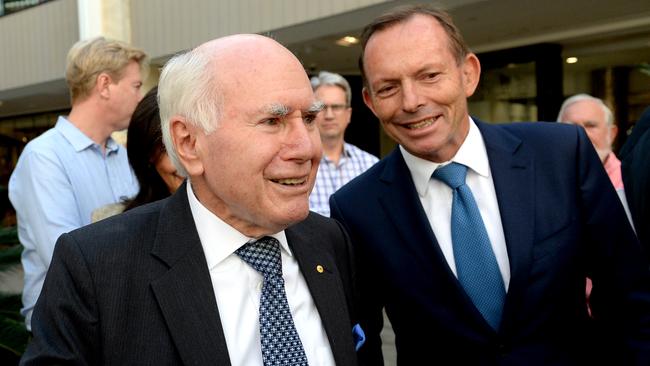Howard, Abbott say past calls for Indigenous recognition being misrepresented
John Howard and Tony Abbott support constitutional recognition of Aboriginal and Torres Strait Islander occupation of Australia, but claim their positions on recognition are being misrepresented.

John Howard and Tony Abbott still support constitutional recognition of Aboriginal and Torres Strait Islander original occupation of Australia, but claim their positions on recognition are now being misrepresented and “went off the rails” to produce a divisive proposal for an Indigenous Voice to Parliament.
Both former Liberal prime ministers who proposed Indigenous recognition in the Constitution say there is support for recognition, but oppose the conflation of recognition in Saturday’s referendum with the Indigenous Voice.
Although they support constitutional recognition for Indigenous Australians, as does Peter Dutton as the current Liberal leader, both say a referendum defeat would mean the public is unlikely to want to face another referendum on the issue for years to come.
Prime Minister Anthony Albanese has described the referendum vote on Saturday as “a once-in-a-generation opportunity” for constitutional change for Indigenous Australians.
Mr Howard said what he proposed in the 1999 referendum to recognise Indigenous Australians in the preamble to constitution was “simple recognition” and that his position has been misrepresented by some in the Yes campaign because he does not support the voice.
“What I proposed was some change to the language of the preamble to recognise that Aboriginal and Torres Strait Islanders were the first residents of what became known as the land mass, the Commonwealth of Australia,” Mr Howard said in a prerecorded interview for a constitutional conference of the Australians for a Constitutional Monarchy in Sydney on Monday.
“It wasn’t recognition which allowed the voice, as some people are trying to imply. I mean, the whole thing has been conflated. I know what John Howard was in favour of, John Howard’s in favour of simple recognition,” he said.
Mr Howard said he believed most Australians would agree to constitutional recognition that Aboriginal and Torres Strait Islander people were the first in Australia because “it is true”.
“But I think if this referendum goes down, which I hope it does, I don’t think the public is going to want to look at another referendum on the issue, you know, in the near future,” he said.
The 1999 constitutional proposal for Indigenous recognition in the preamble received even less support than the republican proposal, which did not get a majority of voters nor support in any state.
Mr Abbott said the process of public involvement for his proposal for constitutional recognition “went off the rails” after Malcolm Turnbull replaced him as prime minister in 2015.
“At the time what I was hoping was that the processes within the parliament and in the wider community would involve everyone. They wouldn’t be largely exclusive to Aboriginal people,” Mr Abbott said.
“Where we went off the rails was by having a series of consultations around the country when Malcolm Turnbull was Prime Minister, culminating in the Uluru Statement, which basically just involved Aboriginal people and, in fact, really was quite selective to those who supported a voice,” he said.
Mr Abbott said he had envisaged a process involving a sample of all Australians which would provide a model which did not substantially change the system of government and which united the nation. “What I envisaged was something around which we could unite. And I think that was necessarily going to be a symbolic as opposed to a substantial change.”








To join the conversation, please log in. Don't have an account? Register
Join the conversation, you are commenting as Logout